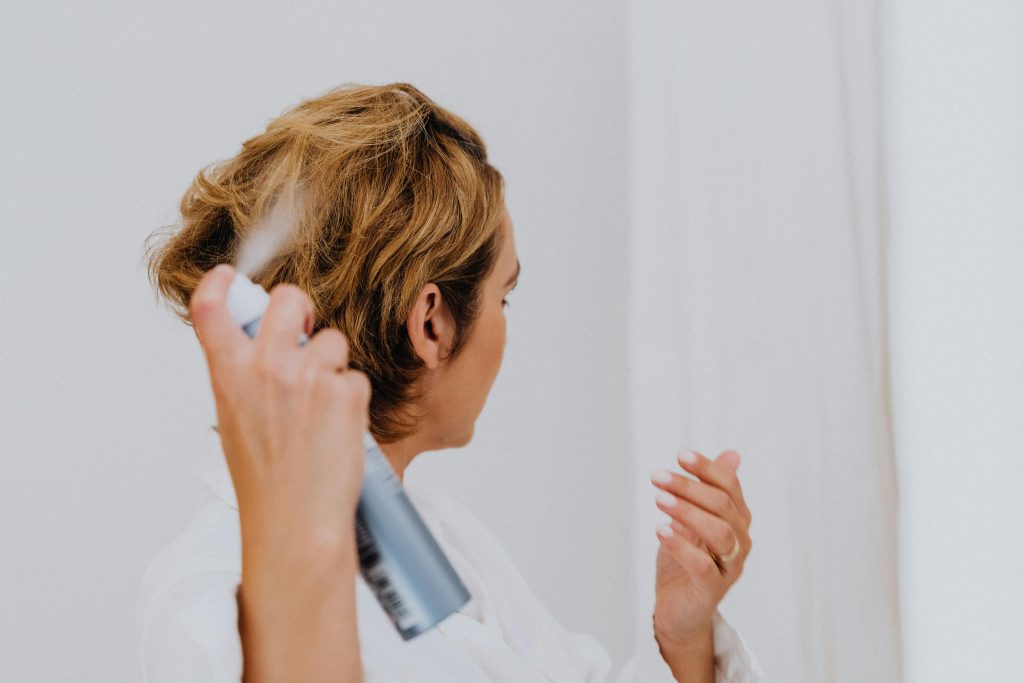Hair loss sprays can do more than cover thinning areas—they can support the scalp and encourage stronger growth over time. The key lies in what goes inside the bottle. Each ingredient plays a specific role in helping hair look fuller, thicker, and healthier. Knowing which ingredients actually work allows a person to choose a spray that supports real results rather than temporary fixes.
This article explains the most effective ingredients backed by research and expert use. It explores how compounds like Minoxidil, Biotin, Caffeine, Niacinamide, and Saw Palmetto contribute to scalp health and hair strength. By understanding these components, anyone can make smarter choices and build a routine that supports lasting hair growth.
Vitamin B5 for improving scalp health
Vitamin B5, also known as pantothenic acid, is a popular ingredient in hair loss sprays due to its ability to strengthen hair and improve scalp health. It helps to nourish hair follicles, promote moisture retention, and reduce hair thinning. Using hair loss spray for men with Vitamin B5 can enhance the overall effectiveness of the treatment by boosting hair vitality and encouraging healthier hair growth.
Minoxidil for clinically proven hair regrowth stimulation
Minoxidil is one of the few ingredients proven through clinical research to help regrow hair. It works by widening blood vessels in the scalp, which improves nutrient delivery to hair follicles. Over time, this process can help reactivate follicles that have become smaller due to hereditary hair loss.
Both 2% and 5% topical forms show results, though the 5% formula often leads to faster improvement. Consistent use is important because stopping treatment may cause new hair to shed again. Dermatologists often recommend it as a first-line option for men and women with thinning hair.
Products that combine minoxidil with nutrients, such as vitamin B5 helps keep hair soft and moisturized, which can complement the regrowth effects of minoxidil. This combination can offer a balanced approach for those seeking visible improvement without harsh treatments.
Biotin to strengthen hair strands and reduce breakage
Biotin, also known as vitamin B7, supports healthy hair by helping the body produce keratin, a key protein in hair structure. It plays a role in keeping strands firm and less prone to damage. People with low biotin levels may notice weaker or thinner hair over time.
Many hair loss sprays include biotin to improve strand strength from the root. It can help reduce breakage and make hair appear thicker with regular use. However, its effects are most noticeable in those who lack enough biotin in their diet.
Foods such as eggs, nuts, and whole grains supply natural biotin. Including these in daily meals can support overall hair health. A spray that combines biotin with other nutrients, such as peptides or B vitamins, may further protect hair and improve scalp condition.
Dermatologists often note that biotin works best as part of a balanced approach to hair care. Healthy nutrition, gentle styling habits, and consistent scalp care all contribute to stronger, more resilient strands.
Caffeine to stimulate scalp circulation and follicle activation
Caffeine can support scalp health by improving blood flow. Better circulation delivers oxygen and nutrients to hair roots, which may help keep follicles active and reduce hair shedding over time.
Research shows that caffeine can counteract the effects of DHT, a hormone linked to hair thinning. By limiting DHT’s impact, it may help preserve follicle strength and slow down hair loss.
Topical products with caffeine often aim to energize the scalp. Regular use may help create a healthier environment for hair growth. However, results vary, and consistent use is key for any noticeable effect.
Caffeine sprays or serums work best when gently massaged into the scalp. This contact allows the ingredient to reach follicles more effectively, supporting stronger, fuller-looking hair.
Niacinamide (Vitamin B3) for improved scalp health and hair density
Niacinamide, also known as vitamin B3, supports a healthy scalp by improving moisture balance and reducing dryness or irritation. It helps the scalp maintain a stronger barrier, which protects against flakiness and discomfort. As a result, hair roots stay in a better environment for steady growth.
This nutrient also supports blood flow to hair follicles. Better circulation helps deliver oxygen and nutrients that hair needs to stay strong and dense. People with thinning hair may notice improved texture and fullness over time with consistent use.
Niacinamide works well in sprays, shampoos, or serums that target scalp care. It pairs safely with other ingredients such as keratin or zinc. Regular use two or three times a week can help keep the scalp balanced and hair looking thicker without harsh effects.
Saw Palmetto to block DHT, a hormone linked to hair loss
Saw palmetto comes from the berries of a small palm native to the southeastern United States. It has gained attention for its ability to block dihydrotestosterone (DHT), a hormone that can shrink hair follicles and slow new growth.
Studies suggest that saw palmetto may reduce scalp DHT levels and help slow mild to moderate hair thinning. It appears to work best for early hair loss and may take several months to show visible results.
Experts note that saw palmetto is not as strong as prescription treatments, yet it offers a natural option for those who prefer plant-based ingredients. It is often used in sprays, shampoos, and supplements aimed at supporting scalp health and thicker hair.
Most people tolerate it well at standard doses, though results vary. Therefore, it can serve as a gentle addition to a broader hair care routine focused on reducing hormone-related shedding.
Conclusion
Choosing a hair loss spray depends on the ingredients that best support scalp and follicle health. Natural options such as rosemary oil, castor oil, and aloe vera can help keep the scalp balanced and hydrated. In contrast, clinically tested compounds like biotin and peptides may help strengthen hair strands and reduce breakage.
Consistency matters as results often appear after several weeks of steady use. A balanced diet and gentle scalp care can also support the spray’s effects.
Reading labels carefully helps avoid harsh chemicals or hormone-disrupting substances. Selecting formulas that support the entire hair cycle—growth, anchoring, and retention—can lead to better long-term results.





















